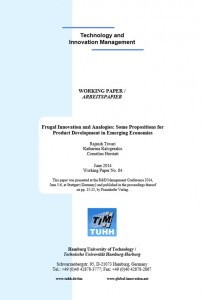 A new paper that seeks to generate some preliminary insights on the use of inventive analogies in the process of creating frugal innovations. The paper has been authored by Rajnish Tiwari, Katharina Kalogerakis and Cornelius Herstatt and was presented at the recently-held R&D Management Conference (June 3-6, 2014) in Stuttgart.
A new paper that seeks to generate some preliminary insights on the use of inventive analogies in the process of creating frugal innovations. The paper has been authored by Rajnish Tiwari, Katharina Kalogerakis and Cornelius Herstatt and was presented at the recently-held R&D Management Conference (June 3-6, 2014) in Stuttgart.
Tag Archives: India
New article: “Changing Dynamics of Lead Markets: A New Role for Emerging Economies as Innovation Hubs”
A new article by Rajnish Tiwari and Cornelius Herstatt, published in The European Financial Review, issue April/May 2014, pp. 69-72.
Lead markets play a crucial role in the global diffusion of innovations. Innovative firms actively seek access to such markets whilst policy makers, especially in Europe, have attempted to foster lead markets by concerted policy measures. Below, Rajnish Tiwari and Cornelius Herstatt suggest that the conventional wisdom on the emergence and functioning of lead markets needs a rethink to better reflect the changing dynamics in the global economy, and argue that dynamic economic growth in largely unsaturated markets and increasing technological capabilities are letting new lead markets emerge in the developing world.
Aiming Big with Small Cars: Emergence of a Lead Market in India
A new book by Rajnish Tiwari and Cornelius Herstatt dealing with frugal innovations and the role of emerging market countries, published by Springer
- Critical analysis of today’s dominant logic and extension of lead market paradigm
- Delivers new assessment tools for identifying emerging lead markets
- Explores opportunities for frugal innovations and their constituent characteristics
- Detailed analysis of a sunrise industry in India
“Too good” to succeed? Why not just try “good enough”!
High-tech, German companies are facing a curious problem: their products are reportedly “too good” for the expanding global markets
—–
A new paper by Rajnish Tiwari and Cornelius Herstatt with the title >> “Too good” to succeed? Why not just try “good enough”! Some deliberations on the prospects of frugal innovations << (Working Paper No. 76, TIM/TUHH)
Abstract
High-tech, German companies are facing a curious problem: their products are reportedly “too good” for the expanding global markets. So in a way they get “penalised” for offering a superlative quality. At a second glance, though, this doesn’t seem surprising. For, succeeding in the emerging markets like India or China often requires developing market-specific products and services that enable an attractive value proposition without taking recourse to (excessive) over-engineering. Furthermore, the innovations should be able to cope with, and successfully circumvent, the given infrastructural restrictions ever so present in the rural and semi-urban areas in such economies.
Innovieren für preisbewusste Kunden: Analogieeinsatz als Erfolgsfaktor in Schwellenländern

An artfical heart developed by IIT Kharagpur based on an analogy to a cockroach’s heart. Photo courtsey: Times of India
Neue Publikation vom Center for Frugal Innovation @TIM/TUHH: Ein neues Arbeitspapier von Rajnish Tiwari und Cornelius Herstatt (Working Paper No. 75, TIM/TUHH) untersucht den EInsatz von innovativen Produktanalogien in frugalen Innovationsprojekten und kommt zum Schluss, “dass frugale Innovationen aufgrund der hohen Bedeutung von Risikominimierung in Produktentwicklungsprojekten häufig eine größere Offenheit für externes Wissen und Analogien aus ihrer Umwelt aufweisen, und davon auch viel profitieren. Den interessierten (potenziellen) frugalen Innovatoren kann diese Methode daher zwecks Reduzierung von Entwicklungskosten und –risiken aber auch zur Steigerung der Prozesseffizient empfohlen werden. Nicht zuletzt zeigen die Fallstudien aber auch, dass der Analogieeinsatz in frugalen Innovationen wichtige Erkenntnisse fürs Management von Innovationsprojekten in nicht-frugalem Bereich liefern kann.”
